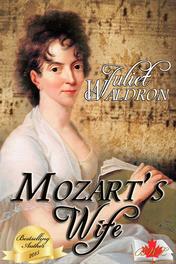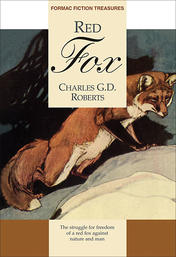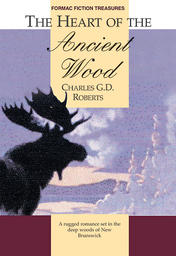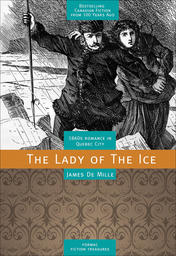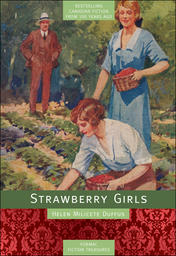Classics

Penny in the Dust
My sister and I were walking through the old sun-still fields the evening before my father's funeral, recalling this memory or that -- trying, after the fashion of families who gather again in the place where they were born, to identify ourselves with the strange children we must have been.
"Do you remember the afternoon we thought you were lost?" my sister said. I did. That was as long ago as the day I was seven, but I'd had occasion to remember it only yesterday. "We searched everywhere,” she said. "Up in the meeting-house, back in the blueberry barrens -- we even looked in the well. I think it's the only time I ever saw Father really upset. He didn't even stop to take the oxen off the wagon tongue when they told him. He raced right through the chopping where Tom Reeve was burning brush, looking for you -- right through the flames almost; they couldn't do a thing with him. And you up in your bed, sound asleep! "
"It was all over losing a penny or something, wasn't it?" she went on, when I didn't answer. It was. She laughed indulgently. "You were a crazy kid, weren't you. "
I was. But there was more to it than that. I had never seen a shining new penny before that day. I'd thought they were all black. This one was bright as gold. And my father had given it to me.
You would have to understand about my father, and that is the hard thing to tell. If I say that he worked all day long but never once had I seen him hurry, that would make him sound like a stupid man. If I say that he never held me on his knee when I was a child and that I never heard him laugh out loud in his life, it would make him sound humourless and severe. If I said that whenever I'd be reeling off some of my fanciful plans and he'd come into the kitchen and I'd stop short, you'd think that he was distant and that in some kind of way I was afraid of him. None of that would be true.
There's no way you can tell it to make it sound like anything more than an inarticulate man a little at sea with an imaginative child. You'll have to take my word for it that there was more to it than that. It was as if his sure-footed way in the fields forsook him the moment he came near the door of my child's world and that he could never intrude on it without feeling awkward and conscious of trespass; and that I, sensing that but not understanding it, felt at the sound of his solid step outside, the child-world's foolish fragility. He would fix the small spot where I planted beans and other quick-sprouting seeds before he prepared the big garden, even if the spring was late; but he wouldn't ask me how many rows I wanted and if he made three rows and I wanted four, I couldn't ask him to change them. If I walked behind the load of hay, longing to ride, and he walked ahead of the oxen, I couldn't ask him to put me up and he wouldn't make any move to do so until he saw me trying to grasp the binder. He, my father, had just given me a new penny, bright as gold. He'd taken it from his pocket several times, pretending to examine the date on it, waiting for me to notice it. He couldn't offer me anything until I had shown some sign that the gift would be welcome.
"You can have it if you want it, Pete,” he said at last. "Oh, thanks,” I said. Nothing more. I couldn't expose any of my eagerness either.
I started with it, to the store. For a penny you could buy the magic cylinder of "Long Tom" popcorn with Heaven knows what glittering bauble inside. But the more I thought of my bright penny disappearing forever into the black drawstring pouch the storekeeper kept his money in, the slower my steps lagged as the store came nearer and nearer. I sat down in the road.
It was that time of magic suspension in an August afternoon. The lifting smells of leaves and cut clover hung still in the sun. The sun drowsed, like a kitten curled up on my shoulder. The deep flour-fine dust in the road puffed about my bare ankles, warm and soft as sleep. The sound of the cowbells came sharp and hollow from the cool swamp.
I began to play with the penny, putting off the decision. I would close my eyes and bury it deep in the sand; and then, with my eyes still closed, get up and walk around, and then come back to search for it. Tantalizing myself, each time, with the excitement of discovering afresh its bright shining edge. I did that again and again. Alas, once too often.
It was almost dark when their excited talking in the room awakened me. It was Mother who had found me. I suppose when it came dusk she thought of me in my bed other nights, and I suppose she looked there without any reasonable hope but only as you look in every place where the thing that is lost has ever lain before. And now suddenly she was crying because when she opened the door there, miraculously, I was.
"Peter! " she cried, ignoring the obvious in her sudden relief,”where have you been?"
"I lost my penny,” I said.
"You lost your penny . . . '? But what made you come up here and hide?"
If Father hadn't been there, I might have told her the whole story. But when I looked up at Father, standing there like the shape of everything sound and straight, it was like daylight shredding the memory of a silly dream. How could I bear the shame of repeating before him the childish visions I had built in my head in the magic August afternoon when almost anything could be made to seem real, as I buried the penny and dug it up again? How could I explain that pit-of-the-stomach sickness which struck through the whole day when I had to believe, at last, that it was really gone? How could I explain that I wasn't really hiding from them? How, with the words and the understanding I had then, that this was the only possible place to run from that awful feeling of loss?
"I lost my penny,” I said again. I looked at Father and turned my face into the pillow. "I want to go to sleep. "
"Peter,” Mother said. "It's almost nine o'clock. You haven't had a bite of supper. Do you know you almost scared the life out of us?"
"You better get some supper,” Father said. It was the only time he had spoken. I never dreamed that he would mention the thing again. But the next morning when we had the hay forks in our hands, ready to toss out the clover, he seemed to postpone the moment of actually leaving for the field. He stuck his fork in the ground and brought in another pail of water, though the kettle was chock full. He took out the shingle nail that held a broken yoke strap together and put it back in exactly the same hole. He went into the shed to see if the pigs had cleaned up all their breakfast.
And then he said abruptly "Ain't you got no idea where you lost your penny?"
"Yes,” I said,”I know just about. "
"Let's see if we can't find it,” he said.
We walked down the road together, stiff with awareness. He didn't hold my hand.
"It's right here somewhere,” I said. "I was playin' with it, in the dust. "
He looked at me, but he didn't ask me what game anyone could possibly play with a penny in the dust.
I might have known he would find it. He could tap the alder bark with his jackknife just exactly hard enough so it wouldn't split but so it would twist free from the notched wood, to make a whistle. His great fingers could trace loose the hopeless snarl of a fishing line that I could only succeed in tangling tighter and tighter. If I broke the handle of my wheelbarrow ragged beyond sight of any possible repair, he could take it and bring it back to me so you could hardly see the splice if you weren't looking for it.
He got down on his knees and drew his fingers carefully through the dust, like a harrow; not clawing it frantically into heaps as I had done, covering even as I uncovered. He found the penny almost at once.
He held it in his hand, as if the moment of passing it to me were a deadline for something he dreaded to say, but must. Something that could not be put off any longer, if it were to be spoken at all.
"Pete,” he said,”you needn'ta hid. I wouldn'ta beat you. "
Beat me? Oh, Father! You didn't think that was the reason . . . — I felt almost sick. I felt as if I had struck him.
I had to tell him the truth then. Because only the truth, no matter how ridiculous it was, would have the unmistakable sound truth has, to scatter that awful idea out of his head. "I wasnt hidin', Father,” I said,”honest. I was. .. . I was buryin' my penny and makin' out I was diggin' up treasure. I was makin' out I was findin' gold. I didn't know what to do when I lost it, I just didn't know where to go. .. .” His head was bent forward, like mere listening. I had to make it truer still.
"I made out it was gold,” I said desperately,”and I -- I was makin' out I bought you a mowin' machine so's you could get your work done early every day so's you and I could go in to town in the big automobile I made out I bought you -- and everyone'd turn around and look at us drivin' down the streets. .. . " His head was perfectly still, as if he were only waiting with patience for me to finish. "Laughin' and talkin',” I said. Louder, smiling intensely, compelling him, by the absolute conviction of some true particular, to believe me. He looked up then. It was the only time I had ever seen tears in his eyes. It was the only time in my seven years that he had ever put his arm around me.
I wondered, though, why he hesitated, and then put the penny back in his own pocket.
Yesterday I knew. I never found any fortune and we never had a car to ride in together. But I think he knew what that would be like, just the same. I found the penny again yesterday, when we were getting out his good suit -- in an upper vest pocket where no one ever carries change. It was still shining. He must have kept it polished.
I left it there.


